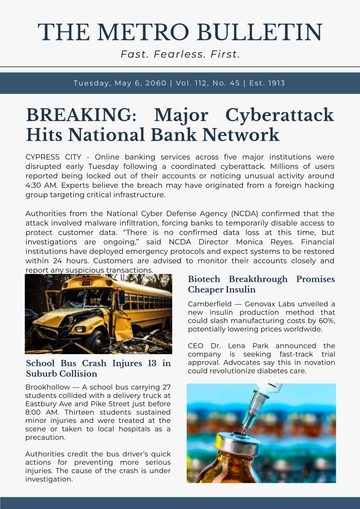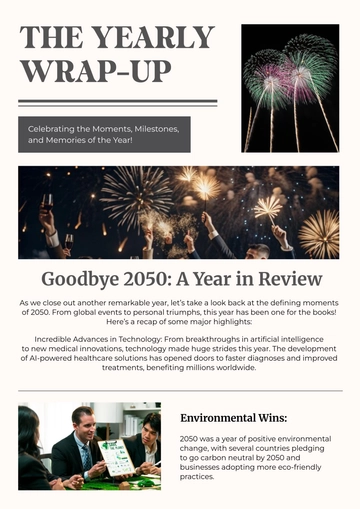Free Engaging News for Newspaper Article

Prepared by: [YOUR NAME]
Date: [DATE]
Abstract
Electric buses are rapidly transforming urban public transportation by offering a cleaner, more sustainable alternative to diesel-powered vehicles. Driven by advancements in battery technology and growing environmental concerns, cities worldwide are embracing electric buses to reduce emissions and improve air quality. This article explores the global shift towards electric buses, highlighting successful case studies in Shenzhen, Los Angeles, and London. It discusses the economic benefits, including lower operating costs and job creation, as well as the challenges such as high initial costs and infrastructure needs. The transition to electric buses represents a significant step towards greener urban transit, with the potential to reshape the future of city transportation.

Introduction: A New Era for City Transit
In a groundbreaking move toward sustainable urban transportation, cities across the globe are rapidly adopting electric buses to replace traditional diesel-powered fleets. This transition is not only transforming how people travel but also paving the way for a greener future. With advancements in technology and increasing environmental awareness, electric buses are poised to revolutionize public transit systems, offering numerous benefits to cities and their inhabitants.
The Shift to Electric Buses: Why Now?
The shift towards electric buses is driven by a confluence of factors including environmental concerns, technological advancements, and economic benefits. Traditional diesel buses are notorious for their high carbon emissions and air pollutants, contributing significantly to urban air quality issues. In contrast, electric buses produce zero tailpipe emissions, which makes them a crucial component in the fight against climate change and urban pollution.
Recent advancements in battery technology have also made electric buses more viable. Improved battery life, faster charging times, and reduced costs have addressed many of the early concerns related to the efficiency and affordability of electric buses. As a result, many cities are now viewing electric buses as a practical and necessary investment in their public transportation infrastructure.
Case Studies: Cities Leading the Charge
Several cities worldwide are setting impressive examples with their adoption of electric buses. In Shenzhen, China, the entire bus fleet has been converted to electric, setting a global benchmark for large-scale electric bus integration. The city's successful transition has demonstrated the feasibility of electric buses on a grand scale, influencing other cities to follow suit.
In the United States, Los Angeles is making strides with its ambitious plans to transition its entire bus fleet to electric by 2030. The city's initiative includes installing extensive charging infrastructure and investing in green technology research. Similarly, London has introduced electric buses in key areas to reduce congestion and improve air quality, showcasing the positive impact of electric buses on urban living conditions.
Economic Implications: Saving Costs and Creating Jobs
While the initial investment in electric buses and their infrastructure may seem daunting, the long-term economic benefits are substantial. Electric buses have lower operating costs compared to their diesel counterparts. They require less maintenance due to fewer moving parts and the cost of electricity is often lower than that of diesel fuel. Over time, these savings can offset the initial capital expenditure.
Additionally, the rise of electric buses is creating new job opportunities. From manufacturing and maintenance to charging infrastructure installation, the electric bus industry is fostering job creation across various sectors. This economic boost is particularly beneficial for communities looking to stimulate local economies and support green technology initiatives.
Challenges and Future Outlook
Despite the promising advantages, the transition to electric buses is not without challenges. Cities must navigate issues such as high upfront costs, the need for substantial charging infrastructure, and the integration of electric buses into existing transit systems. Additionally, the disposal and recycling of old batteries present environmental concerns that need addressing.
Looking ahead, continued innovation and investment in electric bus technology are crucial for overcoming these challenges. Advances in battery technology, coupled with supportive policies and subsidies, will play a significant role in accelerating the adoption of electric buses. As cities work towards creating more sustainable and efficient public transportation systems, the future of electric buses looks increasingly bright.
Conclusion: A Sustainable Future on the Horizon
The rise of electric buses represents a pivotal moment in urban transportation, reflecting a broader shift towards sustainability and environmental stewardship. As cities around the world embrace this innovative technology, electric buses are set to become a cornerstone of modern transit systems, offering cleaner, quieter, and more efficient transportation solutions. The journey towards a greener future has begun, and electric buses are leading the way.
- 100% Customizable, free editor
- Access 1 Million+ Templates, photo’s & graphics
- Download or share as a template
- Click and replace photos, graphics, text, backgrounds
- Resize, crop, AI write & more
- Access advanced editor
Elevate your journalism with the Engaging News for Newspaper Article Template from Template.net. This fully customizable template allows you to create compelling articles with ease. Editable in our AI Editor too, it offers flexibility and convenience for crafting engaging news stories. Perfect for both seasoned reporters and aspiring journalists looking for a professional touch.





























